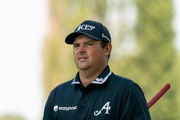

The PGA Tour, founded in 1968, has long stood as golf’s most dominant stage. It built its reputation on tradition, elite competition, and decades of loyal fan support. Yet its greatest strength—a stronghold in the United States—now looks like its biggest limitation. Scottie Scheffler and Jordan Spieth have thrived under that system. Scheffler rose to world No. 1, while Spieth’s flair carried him to multiple majors. Both stayed loyal to the Tour when LIV Golf emerged in 2020 with a bold global agenda. Their decision kept them as the Tour’s faces but also tied them to its domestic calendar. Now comes the tough demand.
Watch What’s Trending Now!
The PGA Tour wants its stars to travel, to test themselves beyond U.S. fairways, and to help grow the game worldwide. For Scheffler and Spieth, that means balancing comfort at home with an obligation to the sport’s global future. Dustin Johnson, a major champion and LIV Golf star, added his voice to the debate. On the No Laying Up podcast, he highlighted how golf thrives when tied to global culture and location. He praised Augusta National and the R&A for backing national opens but pressed for an even broader reach.
On the show, DJ argued that golf’s strongest events should feel connected to their host cities and cultures. He explained that the game grows best when tournaments reflect their surroundings. “You know, it’s truly an event, and it’s truly a reflection of the place. And you do that again by going to the right cities or the right parts of the world at the right time as well. And I think I was stoked to see the R&A and Augusta National make that step with, you know, national opens this week. It’s like, all right, cool. How do you do that even more? How do you lean on, you know, how do you bring the Australian Open into the fold?” Johnson told No Laying Up
ADVERTISEMENT
He praised the effort but pushed for more. To Johnson, adding global stops would not only celebrate golf’s diversity but also secure bigger audiences and stronger sponsorships. He acknowledged that not every player will want to travel but argued that elite names must set the standard.
“And I know some of this is like if Scottie Scheffler and Jordan Spieth don’t want to travel internationally, cool. Like that’s your right. But like, you’re a global—you are the world number five player or the world number 12 player. You’re expected to play worldwide. And if you just want to hang out and play rank-and-file PGA Tour events here at home, that’s your choice. But at the end of the day, if you want to play against the best in the world more often, whether that’s 14, 15, or 18 times a year, you’re going to have to travel outside the country,” Dustin shared.
By calling out Scheffler and Spieth directly, Johnson sharpened the conversation. His message was clear—golf’s top players cannot remain domestic icons if they want the sport to thrive as a global product. Johnson then shifted to the business side of the debate. He argued that global scheduling isn’t just about competition—it drives the sport’s commercial growth.
ADVERTISEMENT
“And then, you know, I think then you naturally have more eyeballs on everything because you’re bringing in a global audience. You’re bringing in global sponsors. Instead of tapping into somebody’s North America corporate budget, you’re tapping into their worldwide marketing budget. That’s the reason some companies don’t work in golf—it’s so siloed between, you know, “Hey, we’re a DP World Tour sponsor,” “We’re a PGA Tour sponsor,” or whatever. No, like we are a global sponsor of golf.”
By highlighting sponsors and audiences, Johnson underlined what the PGA Tour risks by staying U.S.-centric. For him, global events mean global relevance, both competitively and financially. Johnson also addressed the Tour’s recent efforts to modernize. He credited Strategic Sports Group (SSG) for pushing new commercial strategies that Commissioner Jay Monahan might not have embraced alone.
ADVERTISEMENT
“I think, you know, a lot of this stuff—I give the Tour credit to a certain extent. I don’t think Jay did it willingly, but I think over the last two or three years with SSG, I think they’ve been—I think SSG’s been calling the shots as far as, “Hey, here’s our commercial strategy.” I think that they’ve gotten ahead. Like the studios thing is big time. I think having the wherewithal to own and produce the world feed and be able to do that. Now, do I think they’re doing a great job with it? No. Or do I think that they’re staffing PGA Tour Live correctly, or are they staffing like some of the subjective things seem to be off as well?”
His remarks showed cautious optimism. While the Tour has made progress, Johnson believes execution still lags behind the vision, leaving questions about whether it can truly compete on a global scale. While Johnson focused on the commercial side, coach Pete Cowen cut straight to the players.
ADVERTISEMENT

On the 19th Uncut podcast, earlier this year, Cowen argued that top PGA Tour names are holding golf back by refusing to travel. “You have top golfers who don’t want to come outside of America. You’ve got Scottie Scheffler and Spieth, who doesn’t want to play outside America.” Cowen didn’t stop there. He accused both the players and the tour of ignoring their responsibility to grow the sport. “They are not spreading the game; they are not building the game.”
ADVERTISEMENT
That reluctance lands awkwardly as golf’s leadership continues its forgotten merger negotiations with Saudi Arabia’s Public Investment Fund. With nearly $3 billion on the table, the PIF deal is explicitly tied to golf’s international growth. If the Tour’s top stars keep circling U.S. events, it undercuts the very leverage Monahan hopes to wield at the negotiating table. Yasir Al-Rumayyan has made his priorities clear.
Johnson laid out the business stakes. Cowen delivered the blunt truth about players’ responsibility. Together, their critiques expose the same problem from different angles. The players want comfort, the coaches see complacency, and the business minds fear stagnation. It all circles back to golf’s crossroads: without its biggest names embracing global schedules, the Tour risks shrinking at a time when it needs to expand. The push from players, coaches, and business leaders points to the same reality—professional golf cannot thrive if it stays locked inside U.S. borders.
Top Stories
Bryson DeChambeau Visits PGA of America as LIV Golf’s Future Looks Bleak

Bryson DeChambeau Announces Career Move After $500M Demand Put LIV Golf in Worrying Spot

Patrick Reed Cuts Ties With LIV Golf as He Commits to PGA Tour With Public Message

Charley Hull Stands Her Ground After Nelly Korda Disapproved of Her Involvement in New Women’s League

Hideki Matsuyama Lashes Out at PGA Tour as Brooks Koepka Returns Without Serving Any Suspension

ADVERTISEMENT
With the PIF Deal Looming, Commercial Growth Will Decide Golf’s Next Era
Professional golf isn’t just about tee times and trophies anymore. It’s about boardrooms, balance sheets, and billion-dollar decisions. With the PGA Tour’s proposed partnership with Saudi Arabia’s Public Investment Fund (PIF) still unresolved, the sport faces a critical test. As reported, negotiations drag on, and the uncertainty creates pressure to find new sources of commercial growth.
Industry leaders argue the clock is ticking. KPMG’s 2024 golf report noted that sponsorship values and media rights are plateauing in the U.S., while international markets continue to expand. “Golf has to think globally if it wants to grow commercially,” the report stated. The delay in finalizing the PIF framework makes this pivot even more urgent.
Analysts have also warned that golf’s financial landscape is shifting faster than players may realize. In an interview with the Financial Times, sports economist Simon Chadwick explained, “Commercial growth will decide the future of golf, not the comfort of its current stars.” His words reflect a broader concern—while golfers worry about schedules and travel, executives are focused on building sustainable revenue.
ADVERTISEMENT
This is not the first time the sport has faced such tension. In the 1990s, the PGA Tour leaned heavily on TV broadcast deals to fuel its boom. That strategy worked because Tiger Woods transformed ratings almost overnight. But in today’s fractured media economy, no single player can guarantee those numbers. Streaming, betting, and international licensing are the levers now. If golf fails to adapt, history suggests the sport risks stagnation.
Meanwhile, the PIF deal hangs in limbo. The original December 2023 deadline has long passed, and extensions continue. As Bloomberg pointed out, investors see the delay as a sign of hesitation. For sponsors, that hesitation translates into uncertainty. Brands want clarity before committing to long-term partnerships. Every month without resolution makes golf’s commercial pitch weaker.
Still, opportunity exists. The DP World Tour’s recent ventures in Asia and Africa hint at markets that remain untapped. McKinsey research shows that global sports sponsorship could grow 7% annually outside North America. For golf, that means the path to stability lies less in tradition and more in expansion.
ADVERTISEMENT
The takeaway is simple. Comfort is no longer the metric of success. Golf’s leaders must finalize the PIF deal—or find another global partner—before the sport’s commercial engine sputters. In this era, growth is not optional; it is survival.
ADVERTISEMENT
ADVERTISEMENT
ADVERTISEMENT
